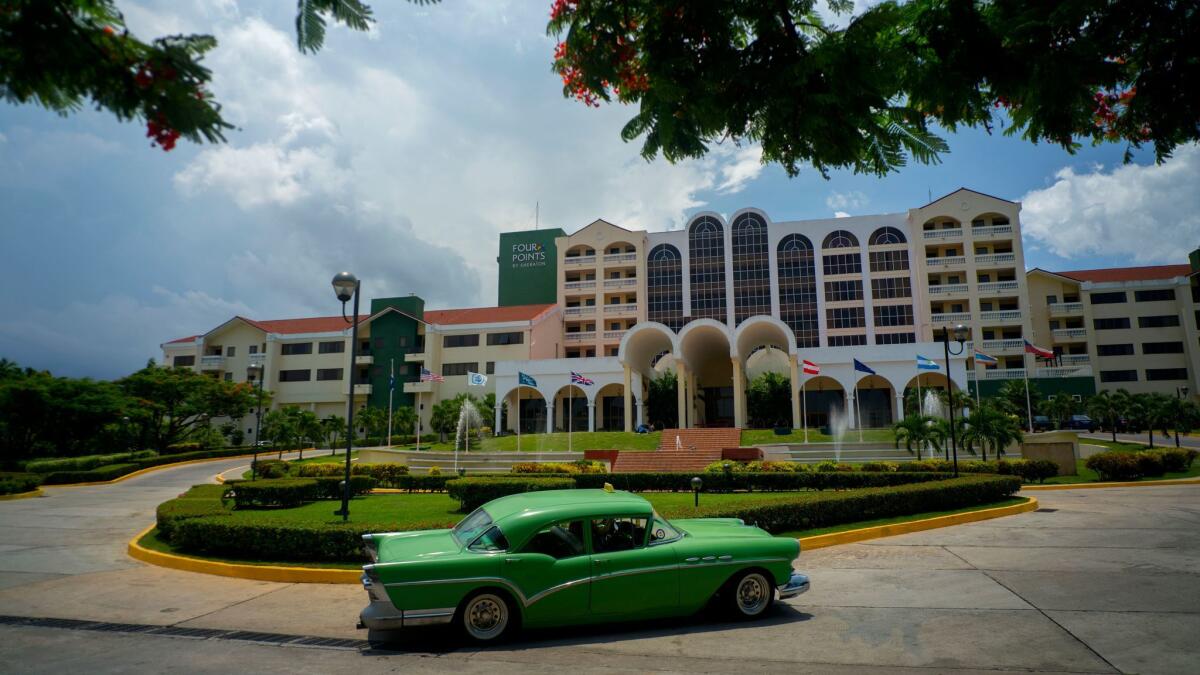What Trump’s Cuba policy means for travelers

- Share via
Three years after President Obama began opening the door for U.S. companies to invest in Cuba, President Trump has announced policy changes that have major corporations unsure of their future in the island nation.
Trump’s new policy, outlined broadly in a speech Friday, would stop individual Americans from traveling to Cuba under the so-called people-to-people exemption and ban business that directly benefits the Cuban military.
Trump’s policy still allows 12 categories of travel to Cuba, including exemptions for guided groups and visits to see family members. And no new restrictions are being placed on what travelers can buy and bring back to the U.S. from Cuba.
But the self-directed, individual travel allowed under the Obama policy will be prohibited.
During a speech in Miami on Friday, Trump said his new policy replaces Obama’s “terrible and misguided” deal with the Castro government with “a deal that’s fair and a deal that makes sense.”
Airlines, cruise lines and hotel companies that have launched business deals with Cuba say they aren’t sure what the new policy will mean for their operations.
American hospitality giant Starwood, which was acquired last year by Marriott International, negotiated a deal last year to manage a 186-room hotel, now called Four Points by Sheraton. That hotel is owned by the Cuban military, and Marriott had planned to negotiate other hotel deals in Cuba.
“We are still analyzing the policy directive issued by the president today, and its full effect on our current and planned operations in Cuba may depend on related forthcoming regulations,” Marriott spokeswoman Barbara Delollis said, adding that the company has “invested significant resources establishing a presence in Cuba.”
Trump administration officials, when asked during a briefing about the Starwood deal, said the details of the policy change would be spelled out under regulations expected to be drafted by the departments of Treasury and Commerce, starting in the next 30 days. But the officials said that the administration doesn’t want to disrupt existing business.
Months before he was elected, Trump said in an interview with CNN that he would consider opening a Trump-branded hotel in Cuba “at the right time, when we’re allowed to do it. Right now, we’re not.” But since his election, Trump has been lobbied by lawmakers and others who thought the Obama administration’s Cuba policy was too lenient.
John S. Kavulich, president of the U.S.-Cuba Trade and Economic Council, said the military is connected to so many businesses in Cuba that it will be difficult for Americans to identify the hotels, restaurants and other merchants that would be prohibited under Trump’s change.
He suggested the U.S. government create a smartphone app that can identify such businesses for U.S. travelers.
Under Obama, several major U.S. carriers began regular routes last fall to Havana and other Cuban cities. Trump’s policy won’t impede such air service but several airlines said it was unclear how Trump’s new restriction on individual travelers will affect demand for flights to Cuba.
“Southwest is now reviewing the president’s statements made this afternoon in South Florida and is assessing impact any proposed changes could have on our current scheduled service to Cuba,” Southwest Airlines spokesman Dan Landson said.
To read more about the travel and tourism industries, follow @hugomartin on Twitter.
ALSO
Trump curtails historic opening with Cuba
In Florida, impact of Trump’s Cuba policy called ‘muted’ by some. Others not so sure
Trump’s proposed changes to U.S.-Cuba travel rules won’t affect cruises, group tours
More to Read
Inside the business of entertainment
The Wide Shot brings you news, analysis and insights on everything from streaming wars to production — and what it all means for the future.
You may occasionally receive promotional content from the Los Angeles Times.











